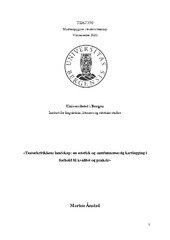| dc.description.abstract | In this thesis I will attempt to examine and systematize the function and practice of a theatre critic in a postmodern society. The primary focus will be on how this practice has developed historically and socially from classical art criticism of the 18th century up to this day. Rather than exclusively concentrating on “criticism” understood as subjective assessments and evaluations of a theatre performance, this thesis will also focus on the various tendencies, discourses, paradigms, and meta-theories that form the critical practice. It is in other words a theatre-related topic with a philosophical and sociological methodology. As part of my methodology I will touch upon a variety of approaches and disciplines. Some of them include theatre science, new-journalism, mass-media, history of ideas, discourse analysis, systems theory, power-knowledge, deconstruction, dialectics, and qualitative research. The thesis will consist of the following parts: 1. A historical overview of how the critic’s practice has evolved over time, and how journalism and postmodern philosophy later have shaped it. 2. An aesthetic overview with focus on the theatre Avant-Garde’s relation to classic theatre conventions, as well as the development of the concept of performativity and its influence on journalism and the marginal theatre. 3. A discussion about the concepts of criticism and quality and their praxis and immanence within the discourse of observation and strategic analysis. 4. A further discourse centered around a critic’s praxis in relation to personal branding and critical theory. 5. An analytic discussion around the social context of Vinge/Müller’s play Panini Boys-Room in order to implement the meta-theories into something concrete. My reasoning for the interdisciplinary nature of the thesis is that I consider a one-sidedly theatre-related and impressionistic approach to be too narrow; the word “criticism” in itself means to pass on a judgment or to position oneself against an established standard, and this practice has found its way in various disciplines such as journalism, philosophy, and sociology. Even within theatre studies it has become more nuanced and opened itself to not only being about subjective evaluations, but also analyzing paradigms, tendencies, values, and social relations within theatre understood as something cultural and/or pedagogical. Professor Knut Ove Arntzen touches upon this in his book Det Marginale Teater (2007), and part of my goal is to further examine the principles and empirical evidence for this in order to systematize the landscape of theatre criticism. | en_US |
